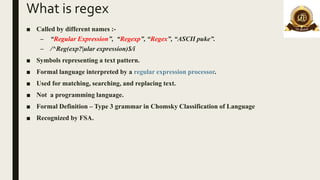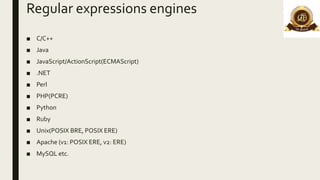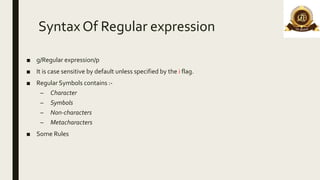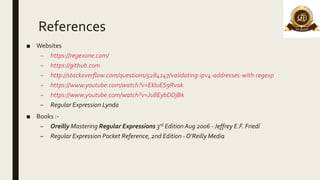Regular expressions
- 1. REGEXThe Black Magic Of Programming Submitted By Brij Raj Kishore
- 2. Motivation For REGEX â System Administrators â Developers â QA Engineers â Support Engineers â User â ^[A-Za-z][A-Za-z0-9_]*$ for identifiers â Pseduo-Code â state = FIRSTCHAR â for char in all_chars_in(string): â if state == FIRSTCHAR: â if char is not in the set "A-Z" or "a-z": â error "Invalid first character" â state = SUBSEQUENTCHARS â next char â if state == SUBSEQUENTCHARS: â if char is not in the set "A-Z" or "a-z" or "0- 9" or "_": â error "Invalid subsequent character" â state = SUBSEQUENTCHARS â next char
- 3. What is regex â Called by different names :- â âRegular Expressionâ, âRegexpâ, âRegexâ, âASCII pukeâ. â /^Reg(exp?|ular expression)$/i â Symbols representing a text pattern. â Formal language interpreted by a regular expression processor. â Used for matching, searching, and replacing text. â Not a programming language. â Formal Definition â Type 3 grammar in Chomsky Classification of Language â Recognized by FSA.
- 4. Type 3 Grammer â Languages defined byType-3 grammars are accepted by finite state automata â Rules are of the form: â A â Îĩ â A â Îą â A â ÎąB â where â A, B â N and Îą â ÎĢ
- 5. Examples â List of all pdf files â abc.pdf, 123.pdf, _12abc.pdf â /^w+.pdf$ â A 6+ letter password with at least: one number, one letter and one symbol -: abc@1236 â /^(?=.*d)(?=.*[a-z])(?=.*[W_]).{6,}$/i â Email format such as -: Aaavv_ahchj@bbb.cccc â /^[a-zA-z0-9_]+@[a-zA-Z0-9]+.[a-zA-z]{2,}$/ â Ipv4 validation â Format is 0.0.0.0 to 255.255.255.255 â ^((25[0-5]|2[0-4][0-9]|[01]?[0-9][0-9]?).){3}(25[0-5]|2[0-4][0-9]|[01]?[0-9][0-9]?)$
- 6. Regular expressions engines â C/C++ â Java â JavaScript/ActionScript(ECMAScript) â .NET â Perl â PHP(PCRE) â Python â Ruby â Unix(POSIX BRE, POSIX ERE) â Apache (v1: POSIX ERE, v2: ERE) â MySQL etc.
- 7. Syntax Of Regular expression â g/Regular expression/p â It is case sensitive by default unless specified by the i flag. â Regular Symbols contains :- â Character â Symbols â Non-characters â Metacharacters â Some Rules
- 8. Symbols and their meanings â abcâĶ.. Letters â 123âĶ Digits â d Any Digit â D Any Non-Digit characters â . Any Character Period â Period â [abc] only a,b or c â [^abc] Not a,b nor c â [0-9] Number 0-9 â w Any Alphanumeric character â b Boundary Between AWord And NonWord Character â B Boundary BetweenWord &Word Or Non-Word & Non-Word.
- 9. â W Any Non-Alphanumeric character â {m} m repetitions â {m,n} m to n Repetitions â * Zero or more repetitions â + One or more repetitions â ? OptionalCharacter â s Any Whitspaces â S Any Non-whitespace character â ^âĶ..$ Starts and end â (âĶ.) Capture Group â (a(bc)) Capture Sub-group â (.*) Capture all â (abc|def) Matches abc or def
- 10. Some Key Points â ., .*, .+, .?, .{1,2} - Arbitrary characters and repetitions â ^, $ - Start and end of subject (or line in multiline mode) â foo|bar - LogicalOr â (foo)(bar) - Subpattern grouping â /(foo|bar)baz1/ - Backreferences â [a-zA-Z] - Character classes. â Negative assertions, Positive assertions are possible -: a(?!x) , a(?=x) â foo not followed by another foo -: /foo(?!foo)/ â foo followed by another foo -: /foo(?=foo)/ â If condition - /(?(condition)yes-pattern|no-pattern)/
- 11. Application Areas â Validation Framework â Pattern Matching â Translation Program â DigitalCircuits â Protocols
- 12. â Ipv6 validation â (?:^|(?<=s))(([0-9a-fA-F]{1,4}:){7,7}[0-9a-fA-F]{1,4}|([0-9a-fA-F]{1,4}:){1,7}:|([0-9a-fA- F]{1,4}:){1,6}:[0-9a-fA-F]{1,4}|([0-9a-fA-F]{1,4}:){1,5}(:[0-9a-fA-F]{1,4}){1,2}|([0-9a-fA- F]{1,4}:){1,4}(:[0-9a-fA-F]{1,4}){1,3}|([0-9a-fA-F]{1,4}:){1,3}(:[0-9a-fA-F]{1,4}){1,4}|([0-9a-fA- F]{1,4}:){1,2}(:[0-9a-fA-F]{1,4}){1,5}|[0-9a-fA-F]{1,4}:((:[0-9a-fA-F]{1,4}){1,6})|:((:[0-9a-fA- F]{1,4}){1,7}|:)|fe80:(:[0-9a-fA-F]{0,4}){0,4}%[0-9a-zA-Z]{1,}|::(ffff(:0{1,4}){0,1}:){0,1}((25[0- 5]|(2[0-4]|1{0,1}[0-9]){0,1}[0-9]).){3,3}(25[0-5]|(2[0-4]|1{0,1}[0-9]){0,1}[0-9])|([0-9a-fA- F]{1,4}:){1,4}:((25[0-5]|(2[0-4]|1{0,1}[0-9]){0,1}[0-9]).){3,3}(25[0-5]|(2[0-4]|1{0,1}[0- 9]){0,1}[0-9]))(?=s|$) â Sometimes you need to know where to stop â Allow some false positive rather than some false negative â Short hand for ipv6 regex â ^((?:[0-9A-Fa-f]{1,4}(?::[0-9A-Fa-f]{1,4})*)?)::((?:[0-9A-Fa-f]{1,4}(?::[0-9A-Fa-f]{1,4})*)?)$
- 13. For Performance â Avoid greedy quantifiers :- /(x+x)+y/ âxxxxxxxxxxxxxxxxxxxxâ â Donât forget anchors (^ and $) â Be as specific as possible â Prefer non-capturing groups ( ?: ) â Minimize backtracking
- 14. References â Websites â https://regexone.com/ â https://github.com â http://stackoverflow.com/questions/5284147/validating-ipv4-addresses-with-regexp â https://www.youtube.com/watch?v=EkluES9Rvak â https://www.youtube.com/watch?v=Ju8EybDDjBk â Regular Expression Lynda â Books :- â Oreilly Mastering Regular Expressions 3rd Edition Aug 2006 - Jeffrey E.F. Friedl â Regular Expression Pocket Reference, 2nd Edition - O'Reilly Media

![Motivation For REGEX
â System Administrators
â Developers
â QA Engineers
â Support Engineers
â User
â ^[A-Za-z][A-Za-z0-9_]*$ for identifiers
â Pseduo-Code
â state = FIRSTCHAR
â for char in all_chars_in(string):
â if state == FIRSTCHAR:
â if char is not in the set "A-Z" or "a-z":
â error "Invalid first character"
â state = SUBSEQUENTCHARS
â next char
â if state == SUBSEQUENTCHARS:
â if char is not in the set "A-Z" or "a-z" or "0-
9" or "_":
â error "Invalid subsequent character"
â state = SUBSEQUENTCHARS
â next char](https://image.slidesharecdn.com/regularexpressions-170131164400/85/Regular-expressions-2-320.jpg)


![Examples
â List of all pdf files â abc.pdf, 123.pdf, _12abc.pdf
â /^w+.pdf$
â A 6+ letter password with at least: one number, one letter and one symbol -: abc@1236
â /^(?=.*d)(?=.*[a-z])(?=.*[W_]).{6,}$/i
â Email format such as -: Aaavv_ahchj@bbb.cccc
â /^[a-zA-z0-9_]+@[a-zA-Z0-9]+.[a-zA-z]{2,}$/
â Ipv4 validation
â Format is 0.0.0.0 to 255.255.255.255
â ^((25[0-5]|2[0-4][0-9]|[01]?[0-9][0-9]?).){3}(25[0-5]|2[0-4][0-9]|[01]?[0-9][0-9]?)$](https://image.slidesharecdn.com/regularexpressions-170131164400/85/Regular-expressions-5-320.jpg)


![Symbols and their meanings
â abcâĶ.. Letters
â 123âĶ Digits
â d Any Digit
â D Any Non-Digit characters
â . Any Character Period
â Period
â [abc] only a,b or c
â [^abc] Not a,b nor c
â [0-9] Number 0-9
â w Any Alphanumeric character
â b Boundary Between AWord And NonWord Character
â B Boundary BetweenWord &Word Or Non-Word & Non-Word.](https://image.slidesharecdn.com/regularexpressions-170131164400/85/Regular-expressions-8-320.jpg)

![Some Key Points
â ., .*, .+, .?, .{1,2} - Arbitrary characters and repetitions
â ^, $ - Start and end of subject (or line in multiline mode)
â foo|bar - LogicalOr
â (foo)(bar) - Subpattern grouping
â /(foo|bar)baz1/ - Backreferences
â [a-zA-Z] - Character classes.
â Negative assertions, Positive assertions are possible -: a(?!x) , a(?=x)
â foo not followed by another foo -: /foo(?!foo)/
â foo followed by another foo -: /foo(?=foo)/
â If condition - /(?(condition)yes-pattern|no-pattern)/](https://image.slidesharecdn.com/regularexpressions-170131164400/85/Regular-expressions-10-320.jpg)

![â Ipv6 validation
â (?:^|(?<=s))(([0-9a-fA-F]{1,4}:){7,7}[0-9a-fA-F]{1,4}|([0-9a-fA-F]{1,4}:){1,7}:|([0-9a-fA-
F]{1,4}:){1,6}:[0-9a-fA-F]{1,4}|([0-9a-fA-F]{1,4}:){1,5}(:[0-9a-fA-F]{1,4}){1,2}|([0-9a-fA-
F]{1,4}:){1,4}(:[0-9a-fA-F]{1,4}){1,3}|([0-9a-fA-F]{1,4}:){1,3}(:[0-9a-fA-F]{1,4}){1,4}|([0-9a-fA-
F]{1,4}:){1,2}(:[0-9a-fA-F]{1,4}){1,5}|[0-9a-fA-F]{1,4}:((:[0-9a-fA-F]{1,4}){1,6})|:((:[0-9a-fA-
F]{1,4}){1,7}|:)|fe80:(:[0-9a-fA-F]{0,4}){0,4}%[0-9a-zA-Z]{1,}|::(ffff(:0{1,4}){0,1}:){0,1}((25[0-
5]|(2[0-4]|1{0,1}[0-9]){0,1}[0-9]).){3,3}(25[0-5]|(2[0-4]|1{0,1}[0-9]){0,1}[0-9])|([0-9a-fA-
F]{1,4}:){1,4}:((25[0-5]|(2[0-4]|1{0,1}[0-9]){0,1}[0-9]).){3,3}(25[0-5]|(2[0-4]|1{0,1}[0-
9]){0,1}[0-9]))(?=s|$)
â Sometimes you need to know where to stop
â Allow some false positive rather than some false negative
â Short hand for ipv6 regex
â ^((?:[0-9A-Fa-f]{1,4}(?::[0-9A-Fa-f]{1,4})*)?)::((?:[0-9A-Fa-f]{1,4}(?::[0-9A-Fa-f]{1,4})*)?)$](https://image.slidesharecdn.com/regularexpressions-170131164400/85/Regular-expressions-12-320.jpg)


